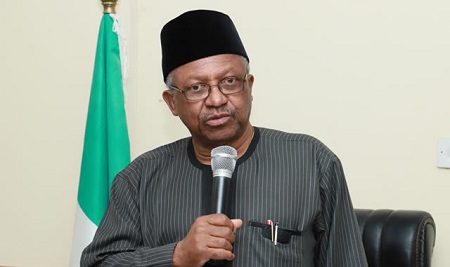The Federal Government has disclosed that an estimated 100 women still die every day in the process of giving life and about 50% of adolescent girls in Nigeria are already mothers by the time they celebrate their 20th birthday
It said, it recognized that the modest improvement made is slow with huge gaps of unmet need for contraceptive however, while the above present a gloomy picture, the government is aggressively stepping up action and efforts, particularly at the subnational levels to traject the trend in the right direction and bridge the gaps.
The Minister of Health, Dr Osagie Ehanire in his Keynote address at the Launch of Nigeria’s Family Planning 2030(FP2030) Commitment and Dissemination of Other Reproductive Health Policy Documents in Abuja, pointed out that the rapid population growth rate can be attributed mainly to the high total fertility rate (TFR) of 5.3 and low modern Contraceptive Prevalence Rate (mCPR) of 12% (NDHS 2018).
Ehanire further disclosed that Nigeria have the highest mortality ratios for women and children in Africa and 2nd highest in the world but significant progress is being made in improving the health status of women and children over last 20 years.
Ehanire further revealed that the President of the Federal Republic of Nigeria, Muhammadu Buhari launched the revised National Policy on Population Management for Sustainable Development.
“The President emphasized the importance of fertility control for improvement of the health of women and children, but also as viable intervention for sustainable growth and socioeconomic development of the country”.
“Efforts are ongoing to leverage additional domestic resources and harness the potentials existing within our large but youthful population through concerted and coordinated efforts of multi-sectoral players in the areas of health, women affairs, education and gainful employment, including Humanitarian crisis as the insecurity has impacted negatively on the health education of girls and adolescents”.
“Although the country witnessed a decline in economic growth in recent times as a result of the Covid 19 pandemic, the potential for rebuilding this growth needs to be enhanced through focused policy decisions and programmes aimed at achieving the demographic dividend and improving the health and level of productivity of women and young persons”.
“Our key aspiration is to ensure universal access to sexual and reproductive healthcare services, including for family planning information and education, and the integration of reproductive health into national strategies and programmes which align with past and ongoing efforts in Nigeria”.
“I am convinced that the realization of this major aspiration would require building on the gains recorded under the Millennium Development Goals (MDGs) and the FP2020 Initiative. This therefore informed the decision to embrace the FP2030 Partnership Agenda which has resulted in the articulation of the set of Commitments that we are about to launch here today”.
“Federal Ministry of Health ensured an inclusive, broad participation of stakeholders, including the participation of Government Ministries and Agencies at both National and sub-National levels, Civil Society Organizations and Youth-led NGOs as well as development partners through interactive sessions and several meetings, which led to drafting and validation of our country’s FP2030 Commitments”.
“The approaches, responsibilities and obligations necessary for addressing various interests as well as sexual, reproductive health and rights of the various segments of the populace have been considered and outlined in the Commitment Document hence the commitment belongs to all of us”.
“Nigeria’s FP2030 Commitment is comprised of One Vision Statement, Eight Broad Commitment Objective Statements and Sixty-four Strategies together with various Accountability Mechanisms to ensure inclusive, transparent, effective, efficient and successful implementation process.
“The Vision Statement for the FP2030 Recommitment Document is “By the end of 2030, Nigeria envisions a country where everyone including adolescents, young people and other vulnerable populations are able to make an informed choice, have equitable and affordable access to quality family planning and participate as equals in society’s development”.
“The Vision Statement and the Commitment Objectives represent our collective resolve as a people determined to change the narrative from negative to positive indices around Reproductive, Maternal, New-born, Child and Adolescent Health plus Nutrition”.
“I strongly believe that as we launch this set of FP2030 Commitments and other Reproductive Health Policy Documents and kick-start their dissemination and implementation today, there would be lots of success stories to be told which I am looking forward to with excitement in the near future”.
“Furthermore, I wish to state that we should not in any way assume that the journey will be very easy as lots of investments would be required in order to achieve the desired results”.
“The good news is that for any financial investment we make will surely result in significant savings in the future in terms of unintended pregnancies averted, abortions averted, sexually transmitted infections including HIV averted, maternal and infant mortalities averted, among other gains”.
“Therefore, we should not relent as it is a wise investment that will yield positive and better outcomes leading to overall national development”.
